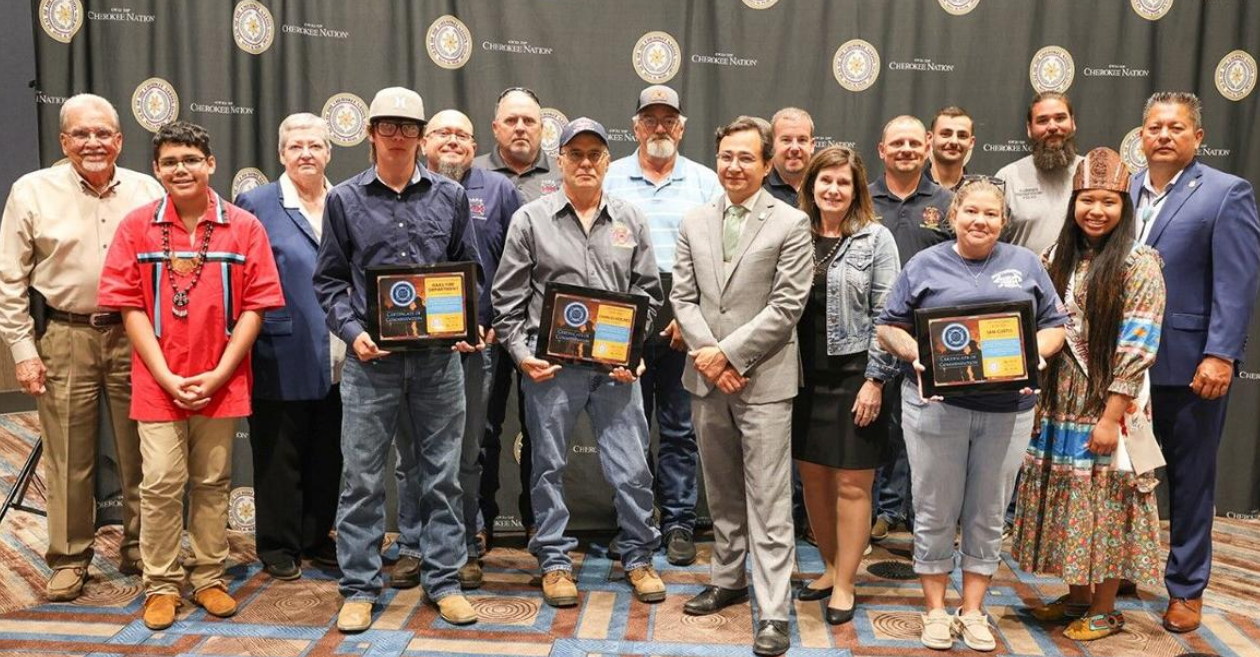
- Details
- By Chuck Hoskin Jr
Guest Opinion. The men and women working in police, fire and emergency services are who we call on to courageously respond first when there’s a crisis. They are our friends, family and neighbors who put their safety at risk to protect our entire community. We owe them our support, not only with words, but with tangible investments in the tools needed to do their jobs.
To support their essential mission, Cherokee Nation is distributing $13 million in one-time grants to local first responders across the Cherokee Nation Reservation. Under the Public Safety Partners Program, grants of up to $50,000 per agency will be available to county sheriff departments, municipal police departments, volunteer and municipal fire departments, emergency medical services, emergency management services, and emergency 911 services.
Protecting communities and families across our 7,000-square mile reservation is a responsibility that Cherokee Nation shares with about 260 municipal and county agencies. This initiative will further strengthen the bond between Cherokee Nation and our community partners. The $50,000 investment per agency will boost units that have struggled economically over the past few years. We can help with any long-term capital, staffing or equipment needs, including those that were exposed during the COVID-19 pandemic.
We unveiled the Public Safety Partners Program at Cherokee Nation’s annual Firefighter Appreciation Banquet recently held in Tahlequah to celebrate the volunteer rural fire departments across our 14 counties. The new effort falls under the Cherokee Nation’s Respond, Recover and

Rebuild spending plan, funded by the American Rescue Plan.
Under our Respond, Recover and Rebuild plan, the Cherokee Nation has already committed over $40 million to our own public safety programs, including a new ambulance fleet and EMS headquarters. We’ve invested tens of millions of dollars more in other key areas, such as growing the Marshal Services budget by over 260% since 2019 and allocating more dollars than at any time in history to our attorney general's office, courts and victim services programs. These measures reflect the tribe’s holistic approach to better public safety at every level.
When Cherokee Nation has the resources to lend a helping hand, we always will. Together, we can accomplish so much more. These wisely invested grant dollars reinforce the daily commitment Deputy Chief Bryan Warner and I have to build a more secure future for the Cherokee people and all of northeast Oklahoma.
We know that effective police, fire and emergency services are an essential foundation to any successful community. Our collaborators in public safety have the proud support of the Cherokee Nation. It is another reminder that a strong, sovereign Cherokee Nation is the best friend Oklahoma has ever had.
Chuck Hoskin, Jr. is the principal chief of the Cherokee Nation.
More Stories Like This
Disrupting Poverty Through OpportunityMarmot Day (Ground Hog Day) and the (Lack of) Law
Sanctuary Cities Under Siege: When Federal Power Becomes a Weapon Against the People
Denmark's Genocidal Practices in Greenland
Cherokee Nation Stands Against Predatory Lending
Help us defend tribal sovereignty.
At Native News Online, our mission is rooted in telling the stories that strengthen sovereignty and uplift Indigenous voices — not just at year’s end, but every single day.
Because of your generosity last year, we were able to keep our reporters on the ground in tribal communities, at national gatherings and in the halls of Congress — covering the issues that matter most to Indian Country: sovereignty, culture, education, health and economic opportunity.
That support sustained us through a tough year in 2025. Now, as we look to the year ahead, we need your help right now to ensure warrior journalism remains strong — reporting that defends tribal sovereignty, amplifies Native truth, and holds power accountable.
 The stakes couldn't be higher. Your support keeps Native voices heard, Native stories told and Native sovereignty defended.
The stakes couldn't be higher. Your support keeps Native voices heard, Native stories told and Native sovereignty defended.
Stand with Warrior Journalism today.
Levi Rickert (Potawatomi), Editor & Publisher

